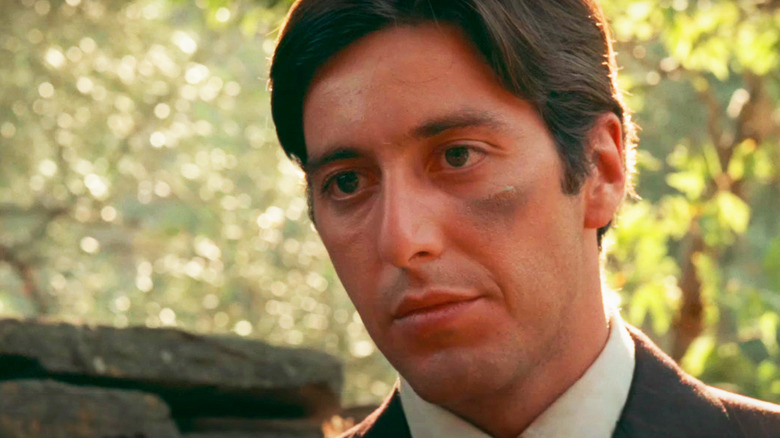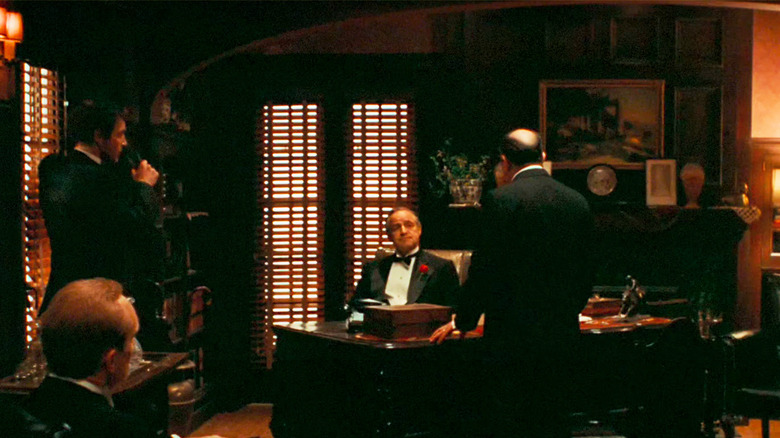Al Pacino Had A Tough Time Coping With The Fame He Achieved Via The Godfather
Al Pacino is such a legendary name in Hollywood, you'd never guess that at one point he was somewhat of a recluse. In the '80s, the actor receded from the spotlight as much as he could, forcing one producer to file suit against him, claiming he dropped out of "Carlito's Way" after promising to star. Pacino only appeared in one movie between 1983's "Scarface" and 1989's "Sea of Love" — a historical drama and box office disaster called "Revolution." Otherwise, he was resigned to staying under the radar.
The young Pacino was so removed from Hollywood that a few people, Oliver Stone included, opined that the actor's career was essentially over. In the decades since, his name became ubiquitous, making it hard to believe that at one point he was trying hard to make sure that didn't happen. So why, considering the storied career he would go on to have, was Pacino seemingly so desperate to forestall it?
Well, it turns out Francis Ford Coppola and "The Godfather" are to blame. The director's celebrated portrait of the Corleone crime family, which unbelievably turned 50 in 2022, was an instant classic that smashed box office records upon its 1972 debut and has only increased in esteem since. That meant the film's stars, including Al Pacino, instantly gained the full attention of the public. For actors such as Marlon Brando and Diane Keaton, that was nothing new. But for Pacino, who's role as Michael Corleone in the movie was only his third film appearance, it was a whole new world — one that he wasn't entirely ready for.
An offer he should have refused?
Coppola's adaptation of Mario Puzo's novel not only broke box office records, it gained critical acclaim and seized popular culture in a way few films ever do. Iconic lines such as "I'm gonna make him an offer he can't refuse" transcended the film to become part of the public vernacular. That was a dizzying level of success for Pacino, who's journey as Michael Corleone to becoming the Don of the Corleone crime family had transfixed audiences worldwide.
Sadly for the actor, something about that level of success didn't sit right with him. As he told the New York Times in 2022: "I felt like, all of a sudden, some veil was lifted and all eyes were on me ... 'The Godfather' gave me a new identity that was hard for me to cope with." So hard to handle was his newly found fame, the young actor famously skipped the Academy Awards after being nominated for his work in "The Godfather." As he told the NYT: "I just was afraid to go ... It was the old shot-out-of-a-cannon syndrome."
For a good few decades following the release of "The Godfather" and the attention it brought, Pacino flirted with the whole recluse thing. He told Vanity Fair in 1989 that the first time he wore a disguise to a concert in New York he "felt so free," with the outlet referring to him as a "fugitive movie star." The now-legendary actor clearly struggled for some time with stardom. Right up until his later years, he seems to have been grappling with the whole thing, telling the NYT it's "it's taken me a lifetime to accept it and move on."
No regrets
For all his attempts to slink away from the spotlight, Pacino has had the kind of high-profile career most actors dream of. It's not surprising that the young actor had trouble with his instant fame. Having previously only gained notoriety in New York for his stage career and with only two other films under his belt, it must have been incredibly disorienting to gain that amount of fame that quickly when "The Godfather" launched. But it is surprising that it took so long for him to come to terms with it.
Someone as talented as Al Pacino was never going to get away with staying out of the spotlight for too long — even if he did manage to sidestep the role of Han Solo in "Star Wars." It's strange to think of the man who so enthusiastically delivered lines such as "great ass!" in "Heat" being so reluctant to stand out. But that's really just testament to his talents as an actor. And it doesn't seem as though Pacino regrets anything about the journey he's been on, as he told The Talks: "Everything you do is a part of you. And you get something from it ... So I don't regret anything."


